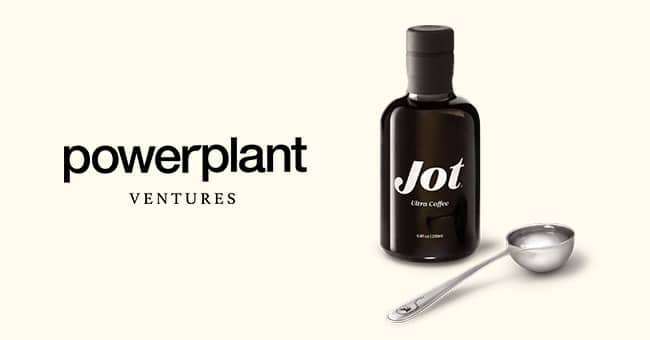Coffee beverage brands have been trying to crack the riddle of scaling direct-to-consumer sales for years. Could the answer come in a tiny 6 oz. bottle?
For less than ideal reasons, now could be the time to find out: With much of the world still under some form of lockdown due to the global coronavirus pandemic, coffee has been one of the categories most impacted by the shift in consumer behavior, with trips to the coffee shop replaced by brewing at home. Against that backdrop comes the launch of Jot Coffee, a new brand of concentrated “ultra coffee” co-founded by REBBL’s Palo Hawken and Andrew Gordon of Square Organics. Packing 14 servings of organic, fair trade coffee per 6 oz. glass bottle, the product aims to use a combination of convenience and quality to open new opportunities in e-commerce.
As the co-founder and chief innovation officer at plant-based elixir brand REBBL, Hawken got plenty of experience with the challenges of working with coffee ingredients. In searching for answers to questions around costs, shipping logistics and quality and concentration levels on an industrial ingredient level, he discovered a “reversed gravitational extraction” process that creates a naturally shelf-stable (unpasteurized) 20x concentrated brew that requires one tablespoon per cup.
Hawken described the final product as similar to cold brew, in which coffee is steeped in water at room temperature, but made using a contiguous brewing process instead of a vat. The process yields 30% more brew per bean, according to the company. Unlike freeze dried instant coffee, in which water is removed to achieve high concentration, pulling out aromatic compounds and flavor notes along with it, Jot’s process achieves a high concentration without pulling out water.
“I started using it instead of brewing coffee in the morning,” he said. “Using it so much as a formulator, it became habitual to grab and use. It wasn’t a bunch of consumer insights, it was really just being forced to make this improved industrial ingredient that ultimately led to a consumer product.”
In its finalized form, Jot is “like having espresso on tap,” Hawken said: With the actual brewing now simplified, consumers are free to explore a broader array of coffee drinks and use occasions for them. While cold brew coffee can also be used to make hot coffee, Jot’s high concentration makes the difference, he noted.
“4x cold brew doesn’t really get you there for making all the cool coffee drinks, and you’re certainly not going to make a hot coffee out of 4x cold brew,” he said. “Each of these forms funnels you into a behavior and into a set of coffee drinks that is limited. But this 20x concentrate, because it’s so small, it takes the form of whatever liquid you are using without undermining it.”
Prior to the coronavirus outbreak, Jot might have seemed like a natural fit in food service as a low-cost, high quality alternative to a fully operational coffee program. That idea has taken a back seat to consumer applications for now, although it is one of several potential paths towards growing the business by expanding into more applications, Hawken said. He acknowledged that Jot’s brewing process could be replicated by a competitor in some fashion down the line, but the company has already refined its technique and scaled its operations — he hopes to be able to ship coffee within 48 hours by 2021 — to be ahead of the theoretical pack.
As a product launch, Jot could serve as a look into the future of direct-to-consumer liquid coffee. For the company, low shipping costs on a 6 oz. bottle help boost its margins. Prior to any discounts or bundles, one bottle costs $24, breaking down to around $1.71 per cup; with price breaks, it can go as low as $20 per bottle and around $1.30 per cup.
“If you compare [that price] to cold brew and the retail margins and all of what goes into the stack up costs, you’re never going to get there,” Hawken said. “I think we have this really great price advantage built into the structure of our business. At the same time, I think our margins will beat any of those other cold brew companies that are doing 2x RTD any day of the week.”
To support his new company’s early stage growth, Hawken reached out to a familiar ally: PowerPlant Ventures, the food and beverage private equity firm that invested in REBBL in 2016 (Hawken had also worked with PPV partner Mark Rampolla at ZICO). The deal was an exception to the fund’s normal investment practices, according to Dan Gluck, partner at PPV. The group does not typically make seed investments — they comprise less than 5% of the its $165 million war chest — but did so to back Jot in September 2019, swayed by the combination of a disruptive concept in a growing category and the opportunity to continue working with a proven entrepreneur. Beyond that, it’s a chance to truly scale an e-commerce-based coffee brand.
While Hawken will continue spending about a quarter of his time on REBBL, currently being run by CEO Michele Kessler, the opportunity presented by Jot to potentially transform direct-to-consumer coffee sales is what’s driving his current interest.
“I think what we are really trying to do here is just prove that this form factor and the combination of the quality, sensual side of this coffee experience and the behavior that goes with that all aligns and comes together as a sticky consumer experience,” he said. “Until we prove that, there’s no reason to spend money on anything other than getting those three pieces to gel and getting the data back from the marketplace.”
Note: An earlier version of this story indicated that Jot Ultra Coffee’s brewing process is proprietary intellectual property of the company, and that the brand currently ships product within 24 hours. The article has been updated.
